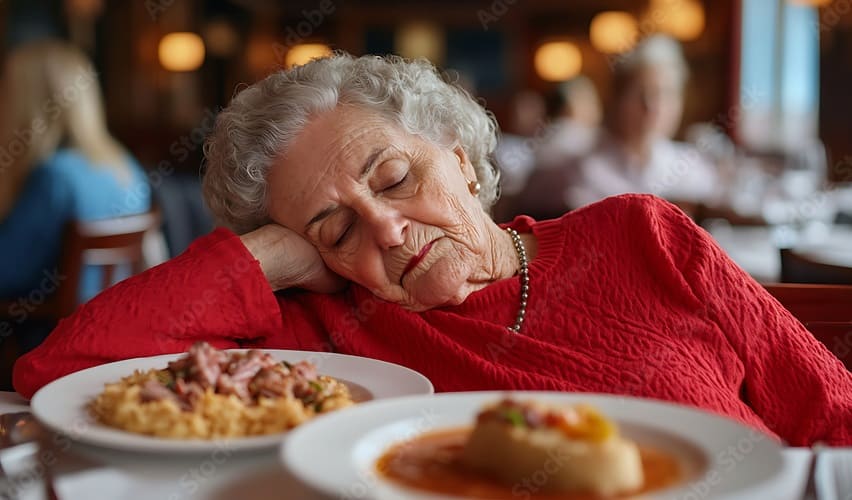You’ve just demolished a plate of cheesy lasagna, maybe added a little dessert for good measure, and now—bam! You’re hit with that all-too-familiar wave of drowsiness. Your body feels heavy, your eyes start drooping, and all you want is a couch and a cozy blanket. Sound familiar?
That sleepy, sluggish state after a meal? That’s what people call a food coma. But it’s not just about eating too much—it’s a real physiological reaction your body has to digestion. Let’s break down what’s really going on in that belly (and brain) of yours after a big meal.
What is a Food Coma?
A food coma, or in science-speak, postprandial somnolence, is that sleepy, sometimes foggy feeling we get after eating. “Postprandial” just means “after a meal,” and “somnolence” refers to drowsiness or a strong desire to sleep.
It’s not harmful by itself (unless you’re operating heavy machinery afterward), but it’s your body’s way of responding to the complex process of digestion—especially after a large or rich meal.
Why You Feel So Sleepy After Eating?
Your body is pretty amazing—it works like a full-blown chemistry lab and factory rolled into one. Here are the main reasons your energy crashes after you chow down:
1. Blood Flow Shifts to Your Gut
When you eat, your digestive system becomes the star of the show. Blood gets redirected to your stomach and intestines to help break down and absorb the nutrients. This shift can temporarily reduce blood flow to the brain, making you feel tired, spacey, or zoned out.
2. Carbs and Sugars Can Crash Your Energy
Foods that are high in refined carbs—like white bread, pasta, pastries, and sugary treats—cause a spike in blood sugar. In response, your body releases a surge of insulin to bring those sugar levels down.
But that rapid rise and fall can lead to a blood sugar crash, leaving you feeling exhausted and ready for a nap. That’s why you might feel more sluggish after pancakes than after a salad with grilled chicken.
3. The Tryptophan Factor
Let’s talk about tryptophan. This is an amino acid found in protein-rich foods like turkey, chicken, eggs, dairy, and even nuts and seeds. Tryptophan helps your body produce serotonin, the “feel-good” hormone that also converts into melatonin, the hormone that helps regulate sleep.
So after a big protein-heavy meal, especially combined with carbs, you might feel especially chilled out—and even a little sleepy.
4. Your Parasympathetic Nervous System Kicks In
After eating, your parasympathetic nervous system (a.k.a. the “rest and digest” system) takes over. This is your body’s chill mode—it slows your heart rate, conserves energy, and tells your body, “Let’s relax and focus on digestion.”
So even if you’re in the middle of a busy day, your internal signals are saying, “Take it easy for a bit.”
5. Dehydration Plays a Role Too
Often, we focus only on food and forget fluids. If you’re not drinking enough water—especially during or after a meal—digestion becomes less efficient, and your body might work harder, making you feel more sluggish.
What Types of Meals Are the Biggest Food Coma Culprits?
While it can happen after any meal, certain foods and eating habits make a food coma way more likely:
- Large portion sizes – Overeating overwhelms your digestive system.
- High-fat meals – Fat takes longer to digest and can make you feel heavier.
- High-carb or sugary foods – Quick spikes in blood sugar are often followed by sharp drops.
- Meals lacking fiber or protein – These help regulate blood sugar and keep energy more stable.
- Eating too quickly – Your body doesn’t get a chance to register fullness, leading to overeating.
Should You Worry About a Food Coma?
Generally? No. A little post-meal drowsiness is totally normal. But if you feel extremely fatigued or this happens after every meal—even small ones—it might be worth checking with a healthcare provider. It could be related to blood sugar imbalances, food intolerances, or other metabolic concerns.
How to Avoid or Beat a Food Coma?
Want to stay alert after lunch instead of curling into a ball at your desk? Try these tips:
- Eat balanced meals – Include protein, healthy fats, and fiber to help stabilize your blood sugar.
- Watch portion sizes – Don’t eat until you’re stuffed. Aim for satisfied, not sleepy.
- Take a light walk after eating – Just 10-15 minutes helps with digestion and keeps energy up.
- Stay hydrated – Drinking water before and during your meal aids digestion.
- Don’t eat too late at night – A heavy dinner close to bedtime can mess with your sleep quality.
Final Thoughts
A food coma isn’t your enemy—it’s just your body taking care of business behind the scenes. Understanding why it happens can help you work with your body, not against it. So next time you feel that post-meal slump coming on, don’t panic. Maybe just take a deep breath, stretch a little, sip some water, and remember—you’re only human.
Also Read:
